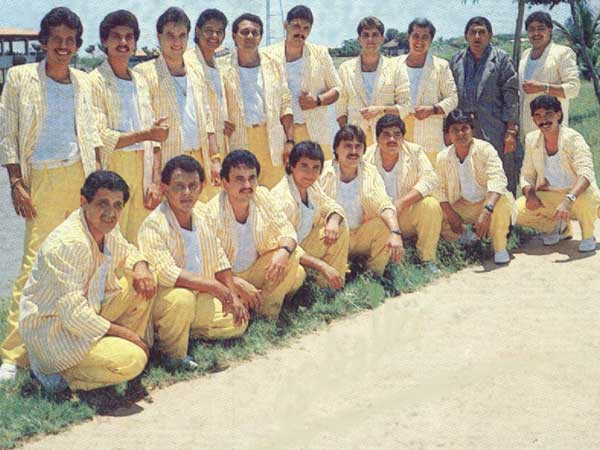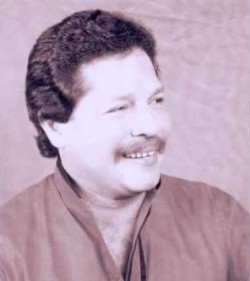
Gaiteros De Pillopo
Band,
Latin
At the beginning of the decade of the 1980s, Pipers of Pillopo was a modest group, advised remotely by Ricardo Portillo, friend and neighbor of the Camacho. To that great bagpiper they dedicated the cover of their first album, which had little diffusion and demure scope. His first success came thanks to the contribution of Argenis Carruyo when he recorded "El Superior", a song by Virgilio Carruyo that was placed in the first places of the national billboards. In 1983 he joined the group Astolfo Romero and submitted it to a musical reengineering. Thus arises its characteristic sound of old beat and young harmony based on the guitar, impeccable choirs and the sound of the small cowbell, used by the timbaleros to mark the beat in the cha cha. Pillopo used it when dubbing the verse and repeating the refrain, in the bagpipe slang they called it "el coquito". The pioneer in performing that cowbell in the bagpipe was Guaco, from 1976, in its second evolutionary stage, he introduced it with the bongo in songs such as "María La Bollera", later in the song "With the Guaco there is no one who can "(1978). Astolfo, with his solid leadership, managed to reunite excellent singers in the ranks of Piper Pipers: Daniel Méndez, whom he had known since the foundational days of Zagalines of Father Vílchez. He undertakes to record to Argenis Carruyo themes such as "El Paladín", "El Superior II" and "Mi Chinita". Later he joins them the compadre and companion of Astolfo in Cardinals of the Success of the Seventies; Danelo Badell. The musical director was Humberto Bracho, exceptional guitarist and arranger, creator of the harmonic concept of Pillopo. Together with Alfredo Maldonado, Tico Carruyo and Gabriel Díaz, they formed the first nucleus of this currency. His first national successes were "La Tienda de Tobías", from 1983, winner of the "Virgilio Carruyo" Award; "El Mercado de los Buchones", from 1984, winner of the "Festival Bagpipes for Zulia" and "El Barbero", from 1985, winner unanimously of all the awards as bagpipes of the year. These three compositions represent the best of the immortal work of Astolfo Romero (1950-2000). Pipers of Pillopo has remained an excellent group of national scope, present in major events, in the records reports, placing season after season issues in competition for the bagpipes of the year. In his long list of soloists are the names of Luis Escaray, Leandro Lenin Montiel, Nelson Romero, Renny Guerra, Eroy Chacín, Enrique Quiroz, Adolfo Ochoa, Eddy Méndez, Luis Germán Briceño, Astolfo David Romero who achieved "the bagpipe of the year" with the theme "El maracaibero" next to Neguito Borjas: To celebrate 30 years of trajectory they recorded their successes orchestrated by the maestro José Luis García and included in their productions songs in fulia time, central revelry, with a new harmonic treatment (genre folklore-fusion, badly called "neofolclor"). This effort has helped to maintain its validity in the national public and have managed to arrive at this anniversary with excellent artistic health. After touring the Venezuelan stages for 32 years, Piteró Pipers represents a tradition sound with an avant-garde staging, a mature style, consolidated, but at the same time fresh, vivacious. For the 2012 bagpiper season his soloists are: Adolfo Ochoa, who also takes the animation in the presentations, Carlos Vílchez, Renny Guerra, Juan León and eventually Ozías Acosta; accompanied by Humberto Bracho on bass and musical direction, who returns to the group two decades later; Ender Méndez in the tambora, Humberto Añez in the furro and Néstor Guerra in the cuatro, among others. A word of three syllables that began as a way of expressing brotherly love among children in a house in Los Haticos, which later became the name of the amateur baseball propeller in Zulia, now represents a respected musical brand, the name of one of the most important groupings of our folklore more raigal: Pillopo.
Members
 | Astolfo Romero voc |
 | Daniel Méndez voc |
 | Manolo Medina cng *1955 |
 | Humberto Bracho g |
 | Junior Alcalá p |
Discography
| Title | Artist | Year | Type |
|---|---|---|---|
| Gaiteros De Pillopo | Gaiteros De Pillopo | 2014 | Album |
| De Viaje | Gaiteros De Pillopo | 1993 | Album |
| Gaiteros De Pillopo | Gaiteros De Pillopo | 1988 | Album |
| Gaiteros De Pillopo | Gaiteros De Pillopo | 1987 | Album |
| Gaiteros De Pillopo | Gaiteros De Pillopo | 1984 | Album |
